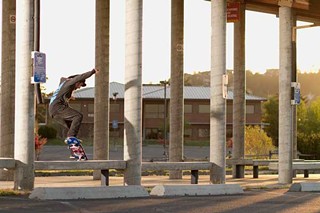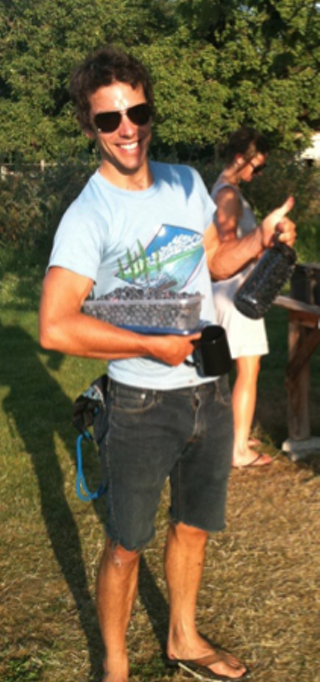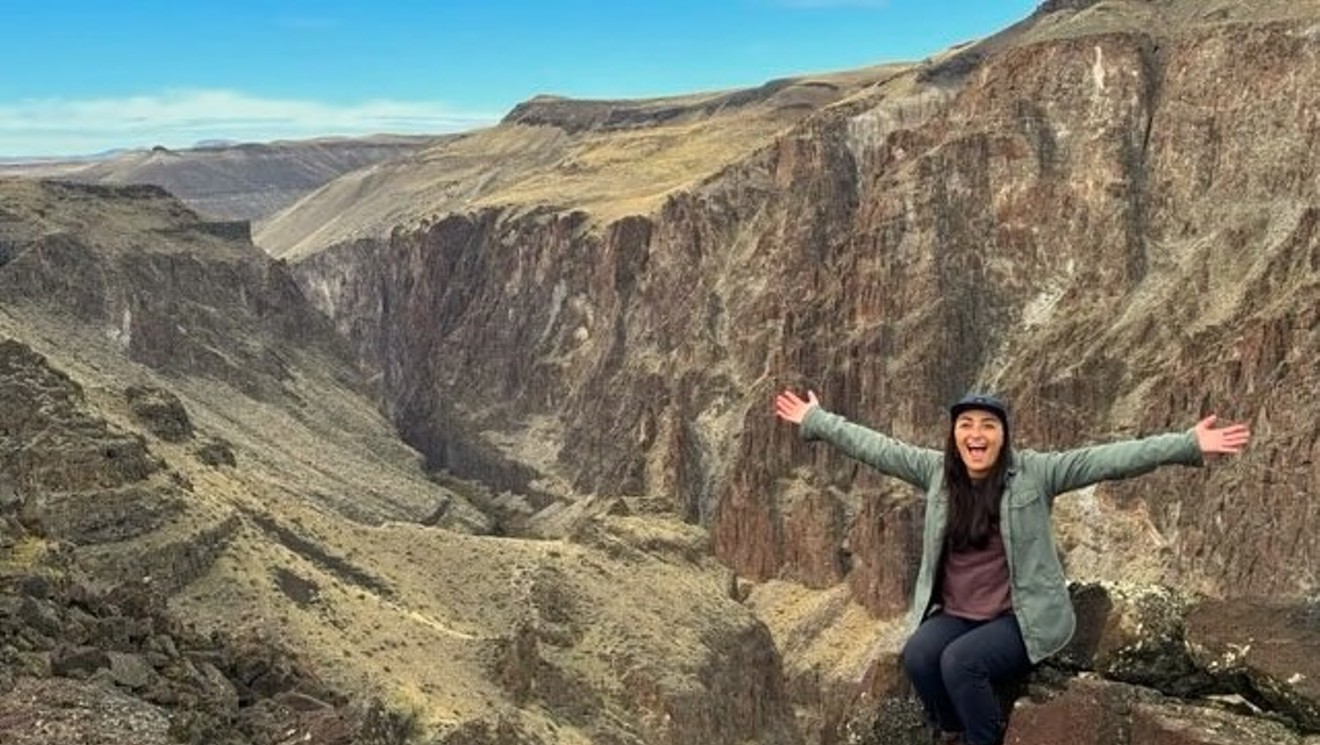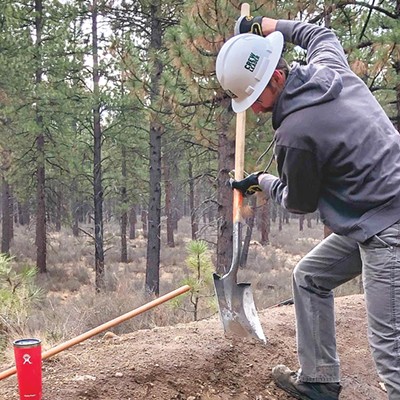Zach Koepke was seven years old the first time the cops were called on him for skateboarding in Bend. At the time, Koepke (now 22) with his shaggy blond hair and outfitted in full pads, was pushing around in front of his Elk Meadow Elementary School; it seemed like a fun place to skate. It was also the only place to skate in Bend.
Koepke and his friend weren't thrashing handrails—they were elementary age. Instead the pint-sized buddies were trying to figure out how to ride off a curb without falling on their faces. A furious, red-faced principal, however, soon interrupted their training session.
"She was screaming and said she was going to call the cops," Koepke remembers. He and his pal made a hasty retreat but were left wondering what they had done wrong. A week later, Kopeke says, there were "No Skateboarding" signs all over school.
Koepke says that Bend then—as now—lacks options for what is one of the nation's most popular sports. According to an International Association of Skateboard Companies report, in 2011 there were 8 million skateboarders in the U.S., which puts the nontraditional sport right behind football and basketball in number of total participants. Despite, the sports popularity, Bend's only skatepark is not up to par.
"Ponderosa is dangerous," says Koepke, referring to the 17-year-old skatepark at Ponderosa Park in southeast Bend. Even a cursory look reveals cracked concrete on many of the skate surfaces, which have become wavy and uneven over time. Weeds and dirt pock the dated features, and trash is strewn nearby. And, an attempt by local skaters to create a different park on Bend's westside and under the shelter of an overpass seems to have stalled out.
That is the irony that Koepke recognizes: Bend is an outdoor recreation utopia, with world-class community-maintained mountain biking trails and daily groomed city parks, but skateboarding facilities are woefully outdated, if not completely absent.
"With all the sun we get and the mountains in the background, it just seems crazy to me," Koepke, a Bend native, says incredulously.
Moreover, Bend is out of step with other cities around Oregon: In 2000, the small farming town of Aumsville (population 3,626) hired Dreamland Skateparks, a top-notch Oregon-based builder of skateparks, to create its massive 8,000 square-foot park; with its glassy, swooping walls and unbroken coping, many consider the park one of the best in the state. Lincoln City, also a fraction the size of Bend (population 7,913), has four skateparks; ranging from 500 to 8,000 square feet; all also built by Dreamland.
No one interviewed for this article denied that the Ponderosa Skatepark, Bend's only dedicated outdoor skate area, is outdated and dilapidated. But the skate community is optimistic all this is about to change. After years of lobbying, area skaters have convinced the Bend Park & Recreation District of the need for a new skatepark. Working together, these two groups—Bend Park & Rec and Bend skaters—are close to breaking ground on a separate skatepark along the south end of Ponderosa Park.
A spot to call their own
For Danny McWilliams, a lanky 25-year-old skateboarder who often judges local skate competitions, skate spots would be a welcome addition.
"We definitely lack a hub," McWilliams says. "It seems like there's nothing to skate in Bend."
McWilliams, who certainly subscribes to the skater DIY ethos, has been a skate advocate since he was a 14-year-old in Corvallis. While there he helped organizers get urban skateparks from the design sheets to the streets. And in Bend, McWilliams, acting as a Central Oregon skate ambassador, has gathered signatures and attended informational meetings with Parks in the hopes of boosting Bend's skate rep.
"Bend is odd," says McWilliams, who's watched smaller towns like Redmond and Sisters build impressive, destination skateparks as Bend has sat idle. "It's crazy that we don't have one—we have a huge snowboard community."
Travis Yamada, a 39-year-old California transplant who's been involved in Bend's skate scene since 1992, reinforces the idea that Bend could be a skate mecca. But, he says, the onus is on the skate community—and he is pleased that the most recent push came from the skaters themselves.
"It really became front and center because the skate community came together and had a strong voice," says Yamada, president of Promoting Urban Skate Habitats (PUSH), a Bend nonprofit.
But this most recent collaborative effort isn't the first from the skate community. About six years ago members of PUSH started batting around an idea for a community skatepark beneath one of Bend's overpasses—giving credence to the idea for the Division Street Skatepark Project.
Members of PUSH became energized after initial conversations with Oregon Department of Transportation officials revealed that the state agency was open to the plan. The idea was to build a skatepark underneath the Bend Parkway in an unused block of land on Division Street. The nonprofit raised money and busted through red tape. But the DIY project stalled as attentions shifted to what looked to be a sure thing—Ponderosa 2.
Yamada and others associated with PUSH explain that DSSP isn't dead in the water, but the promise of a new skatepark and skate spots has, for now, back-burnered Division Street.
"Hopefully this [Ponderosa 2] can be the kick-start to this long-term skatepark vision that we want to see," Yamada says. "Starting out with one midsize park isn't going to satisfy the need, but it's a start. The skate community needs to understand that and take that on as a challenge."
Yamada envisions a larger plan, with skate spots scattered across town in existing parks or as additions to Bend's core. Urban environment replicas—handrails, stairs, ledges and other dedicated street-plaza-like features—could be added to local parks and other central areas in Bend, area skaters say. Such additions are common in other towns with thriving skate communities. Some skatepark builders even specialize in skate art—objects that look like abstract pieces but actually offer engaging skate opportunities, an option that could satisfy even the most cantankerous Bend resident.
Sisters shows how it's done
Dan O'Neill, a Sisters High math teacher, knows what it takes to see a grassroots effort through to fruition.
Two years ago two of O'Neill's students said they wanted to create a skatepark in Sisters and wanted to know if he'd help. O'Neill, an avid skater, agreed but warned his students that it'd be a lot of work—and not the fun kind. He tried to explain to Preston Ferris and Scott Everson, his two students, that they'd face roadblock after roadblock, and not just from the city. They'd have to acquire land, raise money and write contracts.
That didn't slow them down: Ferris and Everson did all that and more.
"The kids were amazing," says O'Neill. They went to school board sessions and meetings at city hall. They created a nonprofit group and did fundraising. And when it came to the manual labor they did some of the paving work, too.
After Ferris and Everson graduated, Davidson Small, another Sisters High skater, picked up where Ferris and Everson had left off. Small helped create a program where students could earn credit for working on the project. Small and others wrote grants, solicited donations and "all of sudden we had the money," O'Neill says.
The project gathered so much momentum that area businesses were soon hopping on board, too. Robinson and Owen Heavy Construction, a Sisters-based excavation company, signed on to do all the digging and Bend's Liquid Stone Designs, a concrete business run by professional skatepark builders, donated design and labor services. Last year the skate collective broke ground on what today looks like an oversized, empty pool. But the 80-foot-long and 40-foot-wide bowl has been a godsend for area skaters.
The project was done on a shoestring budget and proves the power of grassroots gumption, O'Neill says.
"We paid $33,000 and it's worth more like $140,000," says O'Neill. "And now we have a world-class bowl in Sisters."
O'Neill goes on to question whether money is the real issue for Bend's potential skateparks. Nearly a quarter-million is already earmarked by Bend for Ponderosa 2—an amount that dwarfs what Sisters paid out—yet there is still pause whether that's sufficient. "When people say that's not enough money that's a flat-out lie."
Emboldened by their success (and new grant money), O'Neill and company are now launching into phase two of the project. By this summer the Sisters Skatepark should have additional bowls as well as a street section. All this from a town of 2,000.
Ponderosa 2
Matt Mercer, director of recreation for Bend Park & Rec., wants to be clear: The new Ponderosa skatepark, Ponderosa 2, isn't a revamp of what's there: It is a completely new skatepark that will exist separately from the current near two-decade-old skatepark at Ponderosa.
While the skatepark is still in the design phase, Parks has signed a contract with professional skatepark builders Spohn Ranch, a California-based company whose work has been featured at the X-Games. To further sweeten the deal, Charlie Wilkins, an ex-pro skater and Portland resident, is the project's lead designer.
Mercer assures that Ponderosa 2's final design will be the skate community's decision.
"Nationally, the model for cutting-edge, higher-quality skate parks are collaborative public/private projects," says Mercer. "It's not like Parks can wave a wand and solicit a bunch of people—that's got to come from a grassroots effort."
When explaining the skate spots Mercer also revealed that Parks would be open to a new park near downtown Bend. Something that would be "iconic," says Mercer.
The plan for Ponderosa 2, Mercer says, "is making [the skatepark] front and center and a source of pride, rather than something we want to hide."
Ever since Parks dedicated $250,000 from its general fund (as noted in an online budget) to a new skatepark, the publicly funded organization has been all in.
Moreover, Mercer hopes that Ponderosa 2 will be the first of several skate zones in Bend. Like Yamada and others in Bend's skate community, Mercer believes one new skatepark isn't enough.
"If this is the only skate park that's built in Bend in the next 10 years, then yeah, people will be disappointed," says Mercer, who's been with the park district for more than 20 years.
"We're trying to educate people—we are looking at a system of skate opportunities," Mercer says. "The plan is, at some point, to have a signature feature park that's closer to the urban core and a number of smaller skate spots."
When these "skate spots" will begin to appear remains unclear. As of now Parks has no money set aside for such things.
But this may be a chicken-and-egg dilemma that Bend needs to move past. In recent years, Bend has cashed in after attracting high-profile, revenue-generating events like the USA Cycling Cyclocross National Championship races, which, according to Visit Bend, injected an estimated $1.3 million into the local economy in 2010. Were Bend to get behind skateboarding in the same way, Central Oregon could be home to Northwest competitions and tours, which would, ostensibly, bring more money to town, say skate advocates.
From 4 to 8 p.m. on April 17, Parks, at its district office on Columbia, is hosting a Ponderosa 2 design concepting session where, according to Mercer, at least two options will be presented. Those present will be invited to weigh in on what they like and don't like. From there Spohn Ranch will draft a final design that will go to the park board for approval on May 7. Those plans will then be submitted to the city and, if all goes well, and Mercer expects it will, construction on Ponderosa 2 would begin in early July.





























